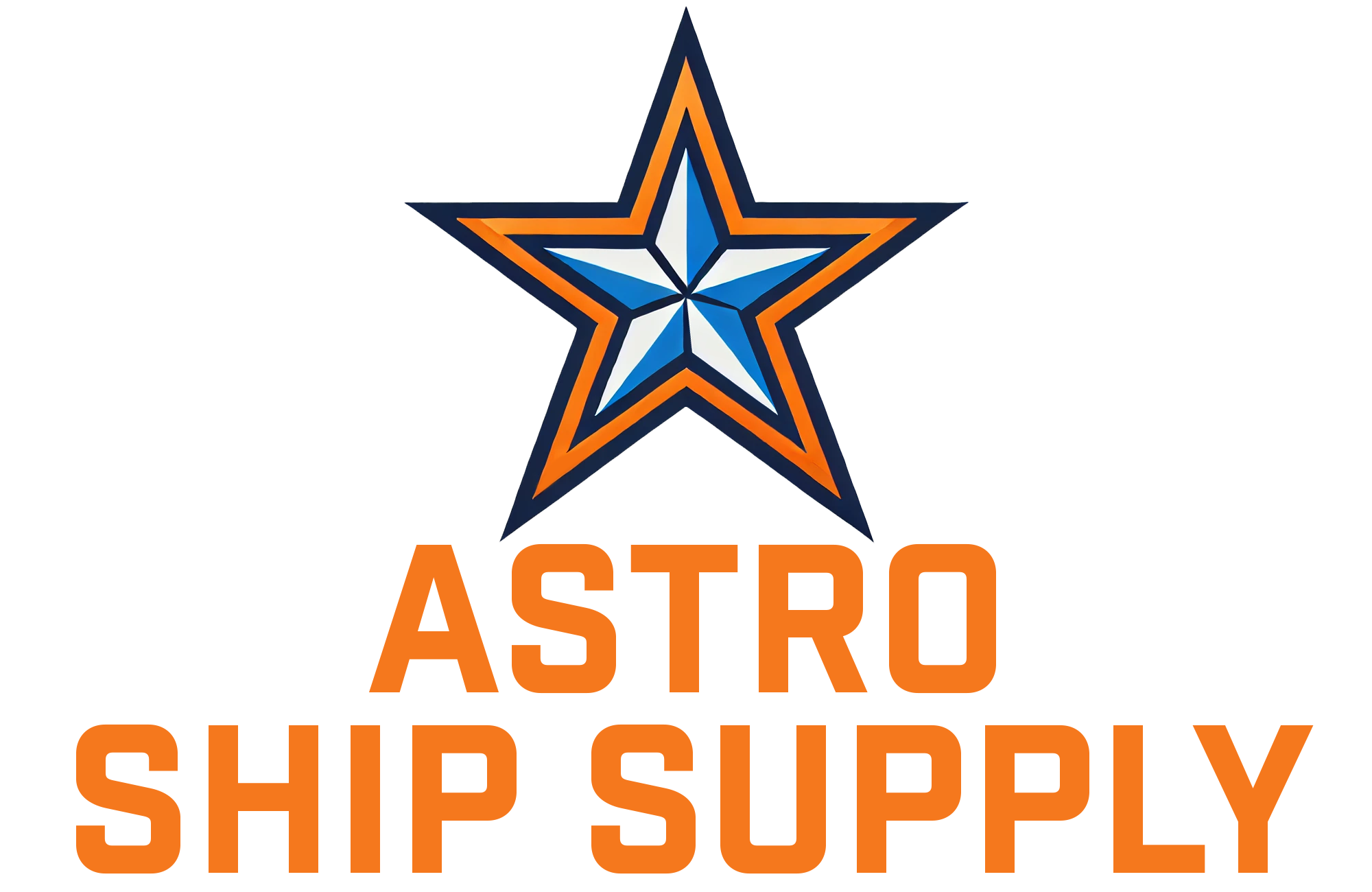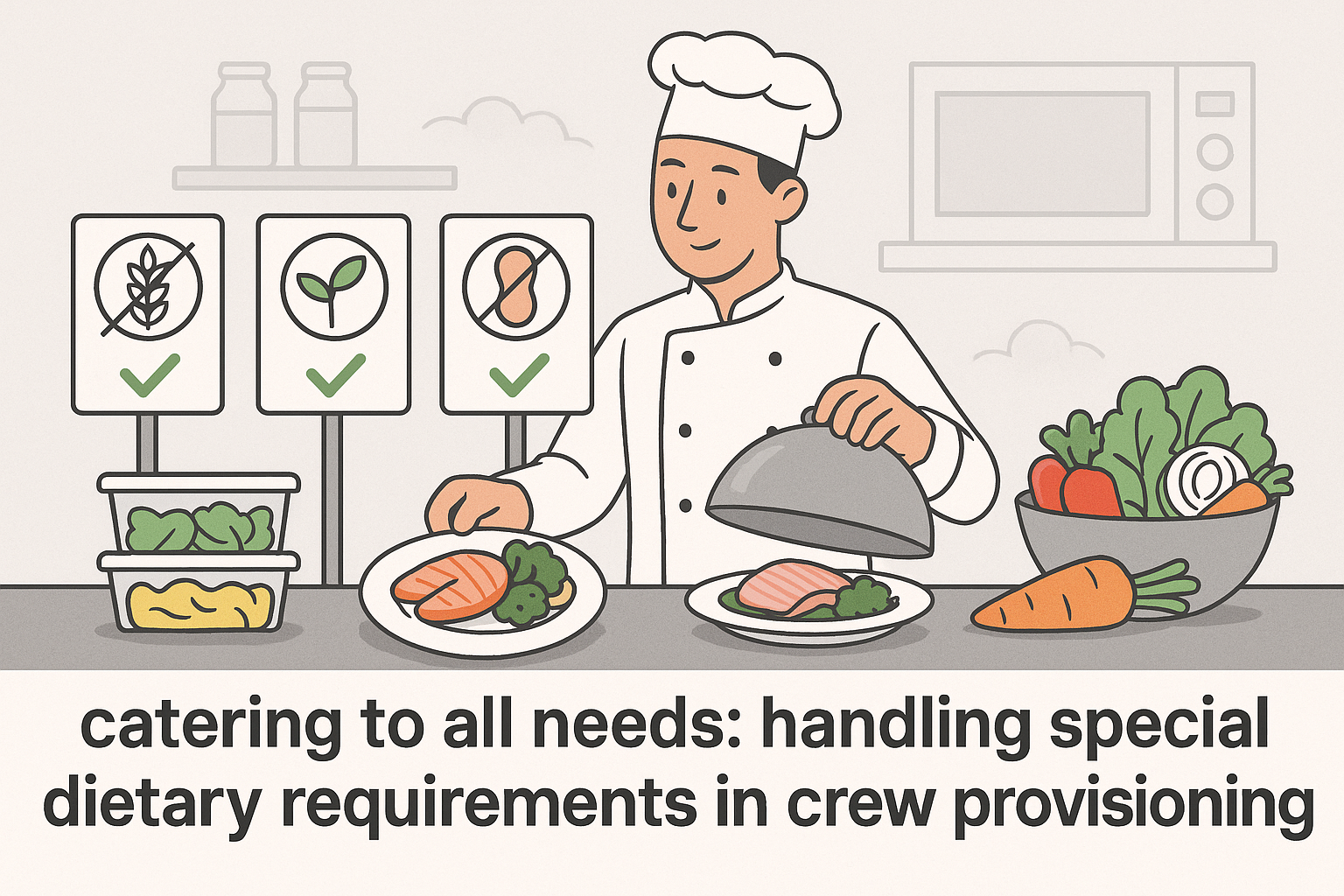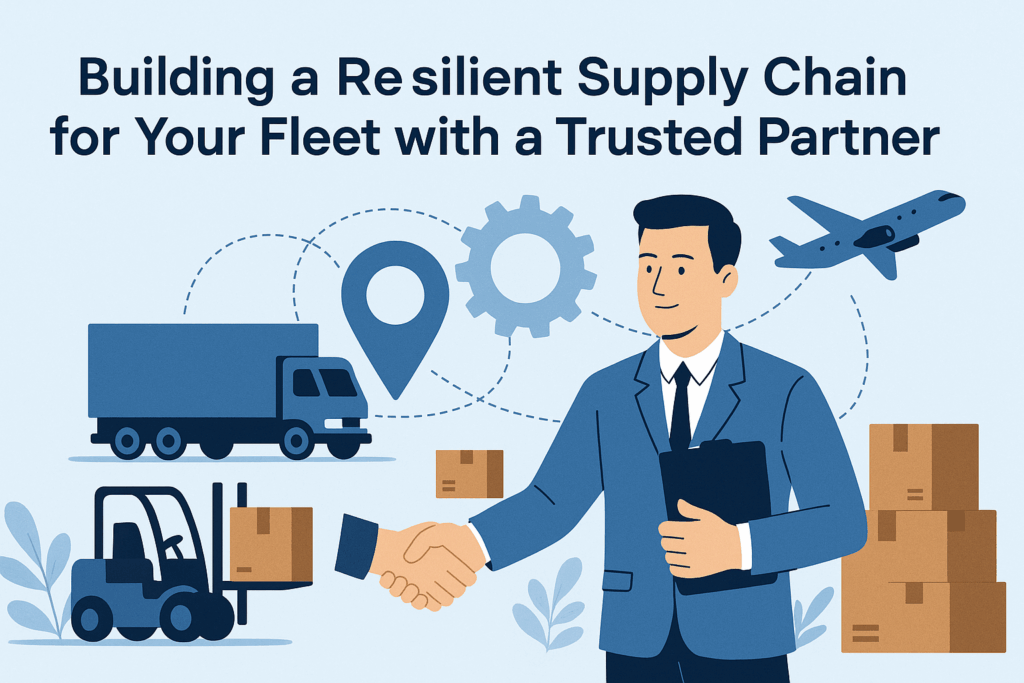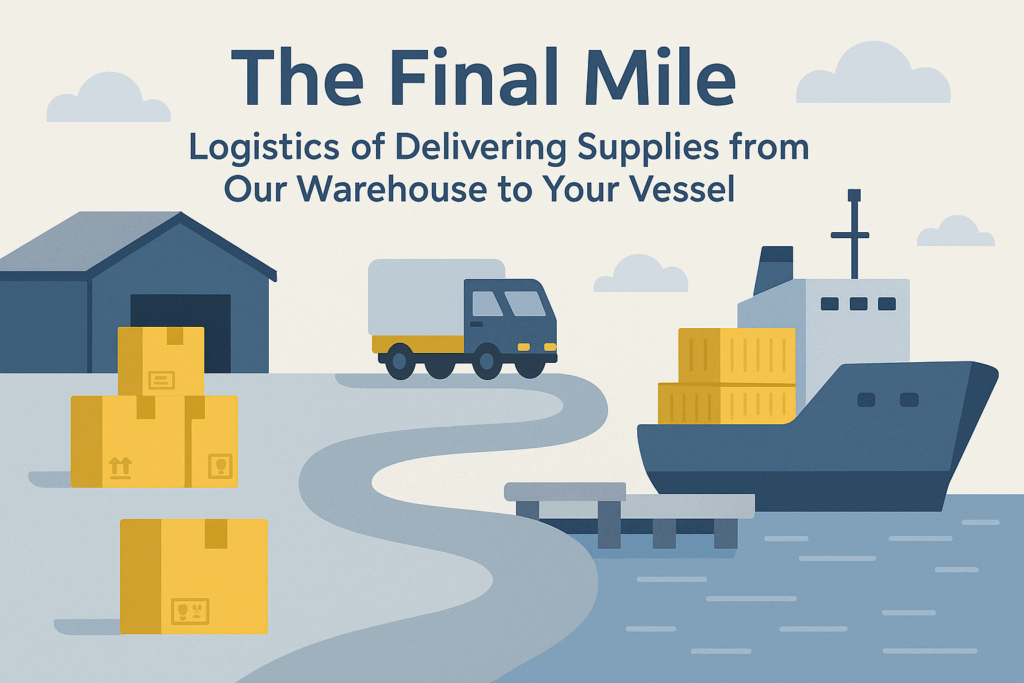More Than Price Tags: Procurement’s Pivotal Role in Maritime Supply Chain Security
For maritime procurement managers, the landscape of responsibility has irrevocably expanded. While cost-efficiency and quality remain paramount, a new, non-negotiable imperative has taken center stage: supply chain security. In an era defined by complex global threats, ensuring the integrity of every link in the chain, especially the delivery of provisions and food supplies, is crucial. The International Ship and Port Facility Security (ISPS) Code isn’t just an operational footnote; it’s a foundational element that procurement professionals must deeply understand and integrate into their supplier selection and management strategies. This isn’t merely about compliance; it’s about proactively safeguarding vessels, crews, cargo, and corporate reputation by making informed, security-conscious procurement decisions, particularly when sourcing from ship chandlers like Astro Ship Supply.
The choices made in an office by a procurement manager have direct, tangible impacts at the quayside and onboard. Selecting a ship supplier solely on the lowest bid without rigorous due diligence on their ISPS compliance can inadvertently open doors to significant security risks, operational disruptions, and severe financial penalties. This piece explores the procurement manager’s critical responsibilities in upholding ISPS standards within the ship supply chain, with a special focus on the security of vital food and water provisions.
The Procurement Mandate Reimagined: From Cost Control to Security Stewardship
The modern maritime procurement manager is no longer just a buyer. They are a strategic guardian of the company’s assets and operational continuity, where security is an intrinsic part of value.
H3: ISPS Code: Why It’s a Procurement Manager’s Direct Concern
The ISPS Code mandates a comprehensive set of measures to enhance maritime security. While vessel operators and port facilities have direct compliance responsibilities, these are unachievable without the full cooperation of third-party vendors, especially ship suppliers. Procurement managers are at the forefront of this interaction because they select and contract these suppliers. Key ISPS elements that directly impact procurement decisions include:
- Access Control: Suppliers need access to restricted port areas and vessels. Their personnel and vehicles must comply with strict entry/exit protocols.
- Secure Chain of Custody: Goods, particularly sensitive items like food provisions, must be protected from tampering or contamination from source to delivery.
- Personnel Reliability: Supplier staff entering secure zones must be vetted (e.g., holding TWIC cards in the U.S.).
- Adherence to Security Levels: Suppliers must demonstrate capability to adjust their procedures based on prevailing port security levels (1, 2, or 3).
Failure by a chosen supplier to meet these requirements can halt deliveries, compromise security, and reflect poorly on the contracting company. For a deeper understanding of general ISPS Code requirements, procurement managers may refer to our comprehensive ISPS guide.
H3: Strategic Risk Management in Sourcing Ship Supplies
Procurement’s role has evolved to include proactive risk identification and mitigation. In the context of ISPS, this means:
- Recognizing that a non-compliant supplier is a security liability.
- Understanding that the true cost of a supplier includes the potential cost of security incidents, delays, and non-compliance penalties.
- Building a resilient supply chain by partnering with suppliers who demonstrate a robust security culture and verifiable compliance.
This strategic approach ensures that the pursuit of cost savings does not inadvertently compromise safety and security standards.
Securing Provisions: An ISPS Focus for Procurement
The security of food and water supplies deserves special attention under the ISPS framework. These are critical to crew welfare and vessel operation, and also uniquely vulnerable to deliberate contamination or tampering if security is lax.
H3: The Vulnerability of the Food Supply Chain
Procurement managers must consider the entire journey of provisions:
- Sourcing: Are provisions sourced from reputable, traceable origins?
- Storage & Handling (Supplier’s Warehouse): Are there adequate security measures at the supplier’s facility to prevent unauthorized access or tampering? Are hygiene and food safety standards (like HACCP, which supports security by ensuring process integrity) maintained?
- Transportation to Port: Are vehicles secure? Are drivers vetted? Is there a risk of items being introduced or swapped en route?
- Delivery at Port/Vessel: Are procedures in place for secure handover, verifying seals, and inspecting goods before acceptance?
A lapse at any of these points can have dire consequences. The ISPS Code, while not a food safety regulation itself, supports the security aspects that protect provisions from malicious acts.
H3: ISPS-Aligned Practices for Secure Provisioning
When selecting a chandler for food supplies, procurement managers should look for evidence of practices that align with ISPS security principles:
- Tamper-Evident Packaging: Use of seals, secure containers, and packaging that clearly shows if interference has occurred.
- Vetted Personnel: Ensuring that all staff involved in handling and delivering food supplies are appropriately vetted and trained in security awareness.
- Secure Logistics: Documented procedures for secure loading, transport, and delivery, minimizing opportunities for unauthorized access.
- Traceability: Ability to trace provisions back to their source, aiding in investigations if an issue arises.
- Coordination with Ship Security Officer (SSO): Clear protocols for coordinating deliveries with the SSO to ensure they meet the ship’s specific security requirements for receiving stores.
Vetting Ship Suppliers: An ISPS Compliance Checklist for Procurement
Effective supplier vetting is a procurement manager’s first line of defense in ensuring ISPS compliance within the supply chain.
H3: Scenario: The Procurement Manager’s Dilemma
Imagine Procurement Manager Sarah needs to contract a supplier for urgent provisions for a vessel calling at a high-security port. Supplier A offers a 10% lower price but has a new, unverified operation and vague answers on ISPS. Supplier B (representing an established, compliant chandler like Astro Ship Supply) provides clear documentation of their ISPS procedures, TWIC-holding staff, and secure logistics for provisions, albeit at a slightly higher quote.
Choosing Supplier A might save upfront costs but introduces risks: delivery delays due to gate denial, potential security breaches if unvetted personnel access the vessel, or even compromise of the provisions. The “saving” could quickly evaporate into demurrage, fines, or worse. Choosing Supplier B, while seemingly more expensive, provides assurance of compliance, security, and operational smoothness – a far better value proposition when total risk is considered.
H3: Key Questions for Your Supplier RFQ/RFP Process
Incorporate these ISPS-specific questions into your supplier evaluation process:
- What are your documented procedures for complying with ISPS Code requirements at various port security levels?
- Are all personnel involved in port deliveries (drivers, handlers) in possession of valid TWIC cards (or equivalent local port ID)? Can you provide evidence?
- Describe your vehicle security measures for transporting goods to port facilities (e.g., seals, locks, tracking).
- How do you ensure the secure chain of custody for sensitive items, particularly food and beverage provisions, from your warehouse to the vessel?
- What security awareness training do your employees receive regarding ISPS and identifying potential threats?
- How do you coordinate with Port Facility Security Officers (PFSOs) and Ship Security Officers (SSOs) for deliveries?
- Can you provide references from other maritime clients specifically addressing your security compliance and reliability?
- What are your contingency plans for deliveries if a port is at Security Level 2 or 3?
H3: Supplier Vetting: Compliant vs. High-Risk Indicators
| Vetting Criteria | Compliant/Low-Risk Supplier (e.g., Astro Ship Supply) | High-Risk/Non-Compliant Supplier |
|---|---|---|
| ISPS Awareness & Documented Procedures | Clear, documented ISPS policies; readily discusses compliance. | Vague or no documented procedures; dismissive of ISPS importance. |
| Personnel Vetting (e.g., TWIC) | All delivery staff possess valid TWIC/port IDs; can provide verification. | Unsure about staff credentials; unwilling/unable to verify. |
| Secure Handling of Provisions | Details procedures for tamper-evident packaging, secure transport, and chain of custody for food items. May cite HACCP or similar quality/safety systems that support security. | No specific procedures for securing provisions; focuses only on basic delivery. |
| Coordination & Communication | Established protocols for coordinating with PFSOs/SSOs; proactive communication. | Reactive; expects vessel/agent to handle all coordination. |
| Transparency & References | Open to audits (desktop or physical); provides credible references. | Resistant to scrutiny; vague or unverifiable references. |
Strategic Payoffs: Why ISPS-Compliant Suppliers Are Better Value
Prioritizing ISPS compliance in supplier selection isn’t an added cost; it’s an investment that yields significant strategic advantages:
- Reduced Risk of Disruptions: Compliant suppliers face fewer hurdles at port gates, ensuring smoother, on-time deliveries of provisions and other essential supplies.
- Lower Financial Exposure: Minimizes risks of demurrage from security delays, fines for non-compliance, or losses from compromised goods.
- Enhanced Corporate Reputation: Demonstrates a commitment to security and responsible sourcing, protecting brand image.
- Improved Crew Welfare & Safety: Ensures that food and water are secure and untampered, directly impacting crew health and morale. Consider other crew needs like cabin supplies as well.
- Stronger Regulatory Compliance: Helps your company meet its own due diligence obligations under maritime security regimes.
- True Cost Optimization: Focuses on Total Cost of Ownership (TCO), where reliability and security contribute to long-term savings over potentially cheaper but riskier alternatives.
Astro Ship Supply: Your Procurement Partner for Secure Provisioning
At Astro Ship Supply, we understand the procurement manager’s need for reliable, compliant, and high-quality service, especially for critical provisions.
H3: Embedding Security into Our Provisioning Services
Our commitment to ISPS compliance is integral to how we deliver food and supplies:
- Vetted Personnel: All our delivery staff are TWIC-credentialed and trained in ISPS awareness.
- Secure Sourcing & Handling: We work with reputable food sources and implement secure handling procedures, often aligned with HACCP principles, from our warehouse to your vessel, ensuring the integrity of provisions.
- Tamper-Evident Measures: We utilize appropriate packaging and sealing methods to protect against and indicate any unauthorized interference.
- Controlled Logistics: Our vehicles and delivery protocols are designed for secure and efficient transit to and within port facilities.
- Transparent Documentation: We provide clear documentation to support your compliance and verification needs.
More details about our stringent approach can be found on our About Us page or by inquiring about our specific ISPS protocols.
Conclusion: Procurement’s Power to Fortify Maritime Security
Procurement managers wield significant influence over the security and resilience of the maritime supply chain. By prioritizing ISPS compliance in the selection of ship suppliers, especially for vital provisions, you are not just fulfilling a regulatory need but making a strategic investment in operational integrity, safety, and corporate responsibility. The choice of supplier is a critical control point; make it count by partnering with those who, like Astro Ship Supply, demonstrate an unwavering commitment to security and compliance.
Secure your supply chain and ensure your crew’s well-being by choosing a partner that understands your responsibilities. Request a quote for your provisions today or contact our specialists to discuss your specific security and supply needs.
ISPS & Procurement: Frequently Asked Questions
How does the ISPS Code impact supplier contracts for procurement managers?
Procurement managers should consider including clauses in supplier contracts that mandate adherence to ISPS Code requirements and relevant Port Facility Security Plans. This can include specifying requirements for personnel vetting (like TWIC), secure handling of goods (especially provisions), vehicle security, and rights to audit compliance. This formalizes the supplier’s security obligations.
Are ISPS-compliant suppliers significantly more expensive?
While there might be marginal costs associated with maintaining ISPS compliance (e.g., training, TWIC fees), these are often offset by increased efficiency and significantly reduced risk of costly delays, fines, or security incidents. Procurement should evaluate suppliers based on total value and risk mitigation, not just upfront price. A compliant supplier often represents better long-term value.
How can procurement integrate ISPS considerations into the RFQ/RFP process?
Include specific questions about ISPS compliance, personnel vetting, secure handling procedures (especially for food provisions), and coordination with port/ship security. Request evidence or documentation of their ISPS program. Make ISPS compliance a weighted criterion in your supplier evaluation matrix.
What are the specific ISPS concerns for sourcing food and water provisions?
The primary concern is preventing intentional contamination or tampering. This involves ensuring a secure chain of custody from source to ship: vetting suppliers’ own security and food safety (e.g., HACCP) practices, ensuring tamper-evident packaging, secure transportation, and verified, controlled delivery onboard. Traceability of food items also becomes a security-supporting factor.
Does choosing an ISPS-compliant supplier absolve the shipping company of its own ISPS responsibilities?
No. The shipping company (and its designated security officers) retains ultimate responsibility for the ship’s security. However, selecting ISPS-compliant suppliers is a crucial part of demonstrating due diligence and effectively implementing the Ship Security Plan (SSP). It’s a shared responsibility, where the procurement manager plays a key role in selecting reliable partners who uphold their part of the security framework.






